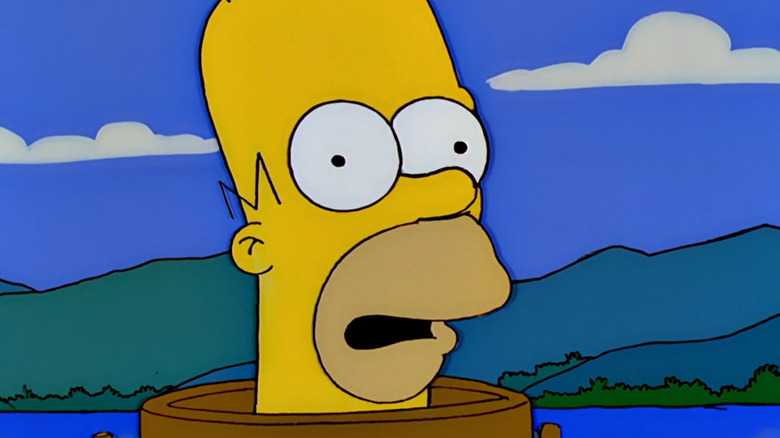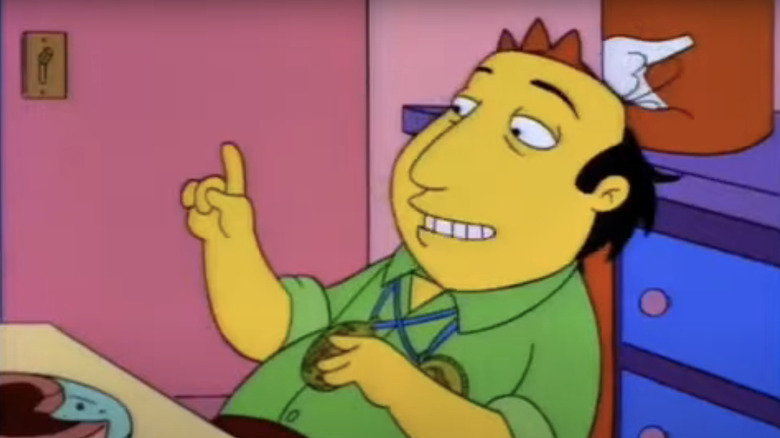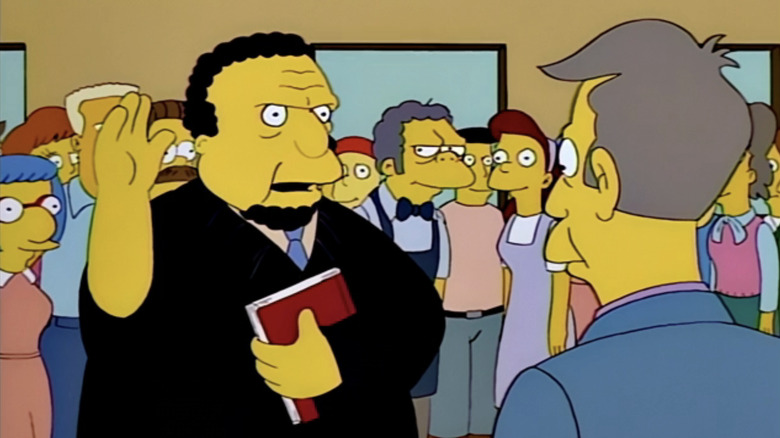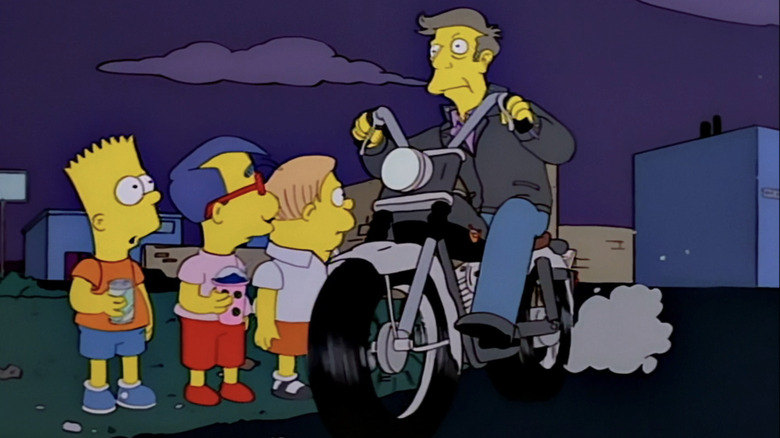The Simpsons Creator Matt Groening Thinks One Episode Was A Huge Mistake
The general consensus on "The Simpsons" is that it started to go downhill somewhere between seasons 7 and 10. Some fans will argue that the first ten years are the real golden age, while others will point to season 3 to 7 as the real sweet spot. Either way, almost all fans will surely agree that "The Simpsons" stopped being good at some point.
For those superfans who remember buying the DVD box sets just to listen intently to the commentary tracks (this writer may or may not be included in that group), you might recall the season 10 episode "Monty Can't Buy Me Love" as a real hinge moment for the series. I distinctly remember then-showrunner Mike Scully having to sweat through the commentary track while a palpable sense of disappointment slowly built. This was, after all, the episode where Mr. Burns travels to Scotland and actually captures the Loch Ness monster, bringing the mythical beast back to Springfield to showcase his majesty and earn the respect and adulation of the populace.
Written by legendary "Simpsons" writer John Swartzwelder, the episode seemed to mark a turning point in the series' history for its embrace of more fantastical elements. Whereas the show had started as a satirical take on the American family that blended humor and heart to brilliant effect, for some, the Nessie episode — which belongs to the same season as another controversial "Simpsons" episode — seemed to represent an abandonment of those principles which had made "The Simpsons" the monolithic hit it was.
But if you ask series creator Matt Groening, Mr. Burns capturing the Loch Ness monster was far from the biggest mistake the show made in those dodgy years when its reputation as the greatest thing on TV was imperiled.
The Simpsons has always had controversial episodes
While we're talking about the DVD commentary tracks, fans will surely remember the season 6 episode "A Star Is Burns," which came with one of the most uncomfortable commentary tracks in series history. The episode was a crossover with the animated series "The Critic," itself created by former "Simpsons" writers Al Jean and Mike Reiss, and featured the main character from that show, Jay Sherman (voiced by Jon Lovitz).
After Jean and Reiss' series was canceled, Fox acquired "The Critic" and placed it in the slot directly after "The Simpsons." "A Star Is Burns" therefore became a way to promote Fox's newly-acquired show — much to the chagrin of Matt Groening. As per the LA Times, the "Simpsons" creator said at the time, "I don't want any credit or blame for 'The Critic' and I feel this [episode] violates the Simpsons' universe." Groening even so far as to have his name removed from the episode's credits.
But even this episode of "The Simpsons" doesn't compare to an infamous later installment. Asked by Rolling Stone in 2002 how he kept a balance between sticking to his original idea for the show and changing with the times, Groening said:
"The show has deviated incredibly from what it started out as, and it will continue to change as the years go on. To the show's credit, we're still telling jokes and stories that are new. And that's a testimony to the writers, who do a fantastic job."
While he was perhaps a little too complimentary about a show which has notoriously struggled to maintain its quality over the past two decades, Groening did, to his credit, admit that "The Simpsons" has made "some missteps," before pointing to a particularly notorious episode in the show's history.
The Simpsons episode the writers knew was a mistake
Illustrating the point about missteps in "Simpsons" history, Matt Groening brought up the season nine episode "The Principal and the Pauper," in which Principal Skinner is revealed to be Armin Tamzarian, an Army veteran who assumed the real Seymour Skinner's identity after he thought Skinner died in the Vietnam War. Some "Simpsons" writers still defend this infamous episode, but many fans view it with the same kind of disdain they harbor for the Nessie installment. For these fans, "The Principal and the Pauper" represents a major step in the show's decline, and amazingly, it seems as if the writers knew as much when they were working on it. As Groening explained:
"We had an episode where it was revealed that Principal Skinner was an impostor. By the time we finished the episode, we realized it was a mistake, and we had a judge say, 'We'll never speak of this matter again.' And we never did."
In the episode, after Skinner's real identity is revealed and the original Seymour Skinner returns to Springfield, Armin Tamzarian skips town only for the Simpson family to track him down and convince him to return home. The real Skinner is then strapped to a train which swiftly takes him out of Springfield, before Judge Roy Snyder reads a statement: "I further decree that everything will be just like it was before all this happened, and no one will ever mention it again, under penalty of torture." This essentially undoes everything that happens in the episode, and is akin to having Bart wake up and realize the whole thing was a dream.
Is the Principal and the Pauper really that bad?
Even Seymour Skinner voice actor Harry Shearer found "The Principal and the Pauper" too much to take, telling the East Bay Express about his initial reaction to the script:
"I said, 'That's so wrong. You're taking something that an audience has built eight years or nine years of investment in and just tossed it in the trash can for no good reason, for a story we've done before with other characters. It's so arbitrary and gratuitous, and it's disrespectful to the audience. Then it was, 'OK, action.'"
Is it ridiculous? Yes. Does it go against eight years of established story for the sake of a cheap twist in an episode that is quickly written out of "Simpsons" history anyway? Yes. But compared to some of the episodes we've gotten in the almost thirty years since this episode aired, I don't think "The Principal and the Pauper" is anywhere near as bad as its reputation suggests.
The episode might abandon believability for the sake of a shocking story, but it is at least funny, with some classic one-liners peppered throughout, including the immortal "Up yours, children." Skinner and his mother's "weekly silhouette" night is a great little detail, and the fact that the real Sergeant Skinner is carried out of town on a train while tied to a chair is ridiculous, yes, but also pretty funny. It's not going to make any list of the best "Simpsons" episodes, but "The Principal and the Pauper" is basically a classic compared to some of the episodes that came in the ensuing decade.



